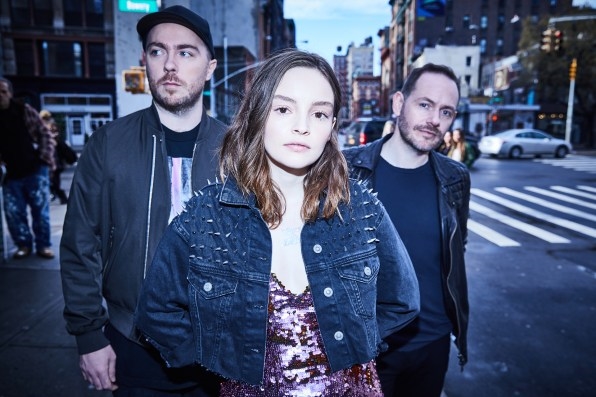The title of the new album by the celestial synth-pop outfit Chvrches does not augur a good time. Love Is Dead conjures images of roses on gravestones, heartbreak at Emo Night, or, well, watching the news in 2018. But that’s not how the album actually sounds.
The band’s latest set of shimmery tunes is triumphantly upbeat, vanquishing those who would “dance on our graves” with extremely danceable beats. From its fired-up opening notes, Love Is Dead captures a band refining its sound while trudging resolutely through tough times. Lead singer Lauren Mayberry has been an outspoken advocate against misogyny for years, and in a post-#MeToo world where Donald Trump is the U.S. president, that sentiment comes across more directly than ever in some lyrics. The downer note struck by those lyrics and the title, however, are blissfully buoyed by a new twist on the same melodic textures that have guided Chvrches’s upward trajectory since the beginning.
Chvrches formed from the ashes of several other Glaswegian groups in 2011. (The band has since relocated to New York, in time for Mayberry to “get one Obama year.”) Their signature blend of pulsating rhythms that one might absentmindedly hum or furiously sweat out in a club, along with Mayberry’s powerful pipes, launched the band straight into the Coachellasphere. After two self-produced hit albums, the group worked with heavyweight producers Greg Kurstin and Steve Mac for their third LP, now available.

While Chvrches caught on quickly, as the band tells it, they’re still carving their path as they go along. Fast Company talked with the group earlier this month, on the eve of Love Is Dead‘s release, about learning to navigate sudden success without a compass–and also accidentally inventing Billy Idol songs, the possibility of an operatic concept album, and other fun stuff.
Fast Company: With this album, some of the lyrics reflect the chaos of this weird moment we’re in. Did you set out to do that, or did it just end up happening?
Lauren Mayberry: We didn’t go in with certain things in mind, it just became apparent after a certain amount of time. That’s the way it feels authentic. You don’t want to deliberately not put things in if it feels honest, but you don’t want to shoehorn shit in because you’re trying to write a manifesto, you know? Even though there are a few more political themes on a few of the songs than there have been on previous records, it’s still coming through a personal lens. It’s about trying to figure out how you feel about things and why you feel the way you feel about things. And I guess that’s always how I write lyrics. You write about where you are.
Martin Doherty: If you would have done that as a character, though, we could have called it a concept album.
LM: A synth-pop opera.
MD: A synth popera.
FC: If you make a synth popera concept album, I am going to be so excited I was here for this.
LM: Anything is possible.
FC: What kind of conversations do you have when you start working on a new album?
MD: It’s not really a conversation that we have. The only thing I remember us really talking about before we went into the studio at the beginning of last year is, “Let’s make this more rockin’. Let’s make it more live, a lot more live drums on it.” That’s the only stylistic discussion that we had. Then there’s a million conversations every day about a million little musical things. But it wasn’t premeditated.
LM: I always wonder about that when someone’s written a concept album. Did they decide they were doing that from the off, or did they start writing and say “Ooh, I really enjoyed this one,” or “I like the themes of that. I think I’m gonna make a body of work out of this.”
Iain Cook: I like to think concept albums come to you in a dream.
LM: Did Green Day write a bunch of songs and then be like, “We’re gonna make American Idiot,” or did they say, “We’re gonna make an album called American Idiot and it will be about the plight of the working class man!”?
IC: I think it’s probably when you’re working within a form and realize these songs hang together.
LM: I went to the American Idiot tour as a teenager, by the way. I caught Tre [Cool]’s drumstick. I still have it. Never used it, though, even though I played a lot of Green Day on drums in high school.
MD: The first song I ever learned on guitar is “Brain Stew” by Green Day. It’s like one finger position, one swipe, and then you just move it down.
LM: That’s the one song I can play on guitar. I remember trying to learn the drums for “Basket Case” so hard. I went in with my headphones on to the music room on lunch break, since I didn’t have a drum kit at home. I had to learn it stage by stage and the people outside were probably like “Oh my God, can you just get to the chorus already?”
FC: The opening song on all three of your albums is soaring and anthemic. Do you know in the middle of making a song that it’s going to be the opener?
MD: Now that you mention it, yeah, every album does open with that kind of song. I’d never considered it.
IC: I think we all have an idea of what we think is a good opener. You go through lots of songs and go, “Nah, nah, nah, ooh.” But we’re never writing the opener in the moment.
LM: The point of an album opener is to take someone by the throat, either with something really in your face or really vulnerable. And there was a brief conversation with an A&R guy on the last album about opening up with the song “Afterglow,” so in a way that’s really aggressive, because it’s aggressive in how vulnerable that song is. And that’s something we thought about on this record. Like, if it’s gonna be the pop moments, we should do that; and if it’s gonna be the more macabre, introspective moments, do that. Just don’t pussyfoot around. Do things honestly and with vigor.
FC: You seem to occupy, and own, this space between indie pop and EDM. Did you arrive at your sound organically or is it something you were actively going for?
MD: We arrived at this sound genuinely. I really don’t want to say it was by accident but I don’t have a more refined word for it. Through experimentation, maybe. I was listening to more music than ever, listening to weird electronic music in the background, and Top 40 never goes away. Eventually, we arrived at this sound as a summary of all that.
LM: Sonically, my voice is quite different from Martin’s, so that may have changed the shapes or textures of some things. [Mayberry was the last member to join the band.]
MD: It was a complete sea change. The melodies were still the same but as soon as you introduce a voice like Lauren’s in that context, it felt special immediately, different from anything I’d ever heard. Those were electric, those first sessions. I’ve still never felt anything close to it.
IC: Once-in-a-lifetime stuff.

FC: So you knew right from the beginning you were on the right track.
MD: I don’t think we ever really knew we were on the right track until people started reacting to the music, but there was certainly an indicator, from our own excitement.
LM: You can sit down and think about what will work and what won’t work but at the end of the day it’s about whether people can work together or not and you can’t really legislate that. I had a vocal coach say to me once, “Your voice is 60% emotion, 40% technique.” And he said that’s the strength of my voice. You can’t train the emotion out of it, and replace it with technique. It’s about finding the balance, being able to do what you need to do to express the emotion.
MD: The first time I heard Lauren sing, it wasn’t an intellectual reaction; it was an emotional response. I hear 100 songs and my reaction is intellectual. “Hmm, that’s interesting. This song is in that key.” But when you hear a singer who your first reaction is emotional, that is rare as rocking horse shit.
IC: It was also a timing thing, though. If we’d met each other 10 years before, it never would have worked.
LM: I would have been a child: 13.
MD: What?
LM: When we met, I was 23. So 10 years earlier and I would have been 13.
MD: That would have been really weird.
FC: You would have been the band with the really weird age dynamic.
LM: I remember having an album when I was 13 that was the best of the ’90s, and I would emotionally play it on the piano. “Everything I Do, I Do It For You,” Bryan Adams, things like that. I started writing songs when I was in high school, and they were really bad.
MD: The first song I wrote was an absolute rip off of “How Do I Live” by LeeAnn Rhimes. It was literally, “I can’t live without you, I can’t breathe without you.” I was 12 and I sat at my parents’ piano and came up with the same melody and everything.
LM: Oh, I remember thinking I’d come up with a song and thought it sounded like a hit and someone was like, “That’s ‘White Wedding’ by Billy idol.” And so it was a hit, but it was not mine.
MD: Our instincts were correct. We were writing hits from day one, just other people’s.
FC: When did you know this band was a hit?
MD: The first time we came here [to the United States]. The venues that I had played to only 10 people [with previous band The Twilight Sad] were sold out on the back of our first song. The Independent in San Francisco is the scene of a couple of the worst nights of my life as a musician and the most failure I’d ever felt on stage. That venue being sold out was a very big deal for me. That was the first indicator. But we still had so much ground to cover.
LM: It’s so hard to get one tune that people respond to, but then how do you translate that to something that doesn’t go away in six months? And I don’t think anybody knows truly how to do that, so you just have to batten down the hatches and write songs.
This interview was edited and condensed for clarity.
(80)